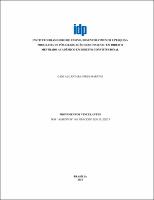Use este identificador para citar ou linkar para este item:
https://repositorio.idp.edu.br//handle/123456789/3852| Título: | Provimentos vinculantes dos “assentos” ao processo sem sujeito |
| Autor(es): | Martins, Caio Alcântara Pires |
| Orientador(es): | Robl Filho, Ilton Norberto |
| Palavras-chave: | Devido Processo Legal;Processo sem sujeito;Provimentos vinculantes |
| Data de submissão: | 2022 |
| Editor: | IDP/EAB |
| Citação: | MARTINS, Caio Alcântara Pires. Provimentos vinculantes dos “assentos” ao processo sem sujeito. 2022. 183 f. Dissertação (Mestrado Acadêmico em Direito Constitucional). – Instituto Brasileiro de Ensino, Desenvolvimento e Pesquisa, São Paulo, 2021. |
| Resumo: | O presente trabalho trata dos provimentos vinculantes, enunciados concebidos pelo Poder
Judiciário no julgamento de casos concretos, mas que deles se deslocam visando a vinculação
em problemas futuros, de mesma natureza. Faz considerações sobre o princípio da separação
de poderes, da concepção clássica à releitura da teoria montesquiana, observada pelo
Constituinte de 1988 ao instituir efetivos freios e contrapesos. Expõe o vínculo genético dos
mecanismos vinculantes com os “assentos”, decretados inconstitucionais pelo Tribunal
Constitucional português em 1993, por usurpação da função legislativa, com base na doutrina
de Castanheira Neves. Faz a distinção entre esses provimentos e os genuínos precedentes do
common law para se contrapor teses como a das Cortes de Vértice, cujos julgados se impõem
na ordem jurídica apenas pela autoridade de quem os proferiu. Também propõe que, caso se
pretenda adotar um verdadeiro regime de stare decisis no Brasil, é preciso assimilar a índole
histórico-problemática daquele sistema. Por fim, mostra as razões pelas quais, a despeito de sua
inconstitucionalidade por falta de previsão na Lei Maior, os provimentos significam a reação
do Judiciário à tardia formação da sociedade de massas à procura da justiça, numa razão
instrumental que disfarça uma lógica econômica e exclui a efetiva participação do indivíduo na
tomada de decisão. O que se vê, portanto, é um processo sem sujeito. |
| Abstract: | The present work deals with binding provisions, which are enunciations conceived by the Judiciary in the judgment of concrete cases, but that are displaced from them in order to be binding in future problems of the same nature. It makes considerations about the principle of the separation of powers, from the classical conception to the rereading of the Montesquian theory, observed by the 1988 Constituent when instituting effective checks and balances. Exposes the genetic link of the binding mechanisms with the "assentos", declared unconstitutional by the Portuguese Constitutional Court in 1993, for usurpation of the legislative function, based on Castanheira Neves's doctrine. Distinguishes between these provisions and genuine common law precedents to counter the thesis of the Vertex Courts, whose judgments are imposed on the legal system only by the authority from who issued them. It also proposes that, if a true stare decisis system is to be adopted in Brazil, the historicalproblematic nature of that system must be assimilated. Finally, it shows the reasons why, despite their unconstitutionality for lack of provision in the Major Law, the binding provisions mean the reaction of the Judiciary to the late formation of the mass society in search of justice, in an instrumental reason that disguises an economic logic and excludes the effective participation of the individual in decision making. What we see, therefore, is a process without a subject. |
| URI: | https://repositorio.idp.edu.br//handle/123456789/3852 |
| Aparece nas coleções: | Mestrado Acadêmico em Direito Constitucional |
Arquivos associados a este item:
| Arquivo | Descrição | Tamanho | Formato | |
|---|---|---|---|---|
| DISSSERTAÇÃO_CAIO ALCÂNTARA PIRES MARTINS_ MESTRADO ACADÊMICO EM DIREITO CONSTITUCIONAL.pdf | 1.82 MB | Adobe PDF |  Visualizar/Abrir |
Os itens no repositório estão protegidos por copyright, com todos os direitos reservados, salvo quando é indicado o contrário.
